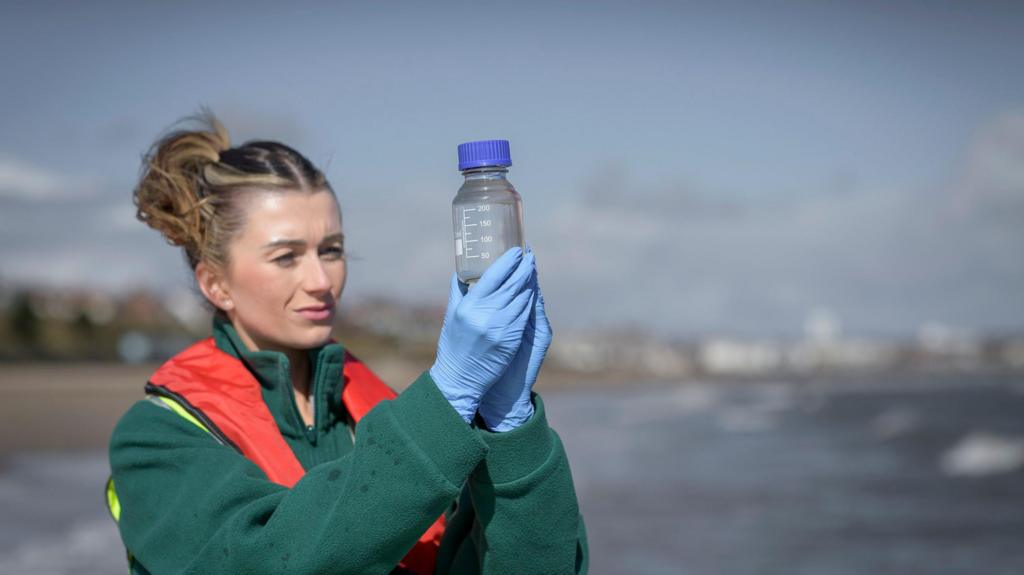“`html
Water companies in the UK have been directed to address potentially dangerous levels of per- and polyfluoroalkyl substances (PFAS), commonly known as “forever chemicals,” in drinking water sources serving over six million people, according to a BBC investigation.
PFAS are a group of thousands of synthetic chemicals used in a wide array of consumer and industrial products. They are persistent in the environment, and some have been linked to adverse health effects.
The BBC analyzed 23 enforcement notices issued by the Drinking Water Inspectorate (DWI) concerning elevated PFAS levels deemed a “potential danger to human health,” to determine the number of individuals affected.
Water UK, the industry body representing water companies, stated it was confident that drinking water remains safe.
However, Water UK also advocated for a ban on PFAS to prevent further environmental accumulation.
Since 2021, water companies have been required to test for 47 PFAS of concern in water supplied to homes and in sources like aquifers and reservoirs.
In the past four years, 1.7 million tests for individual PFAS have been conducted. At least 9,432 of these tests recorded PFAS levels exceeding the DWI’s threshold for potential health risks .
When PFAS levels surpass 0.01ug/L (micrograms per litre), the DWI issues enforcement notices, mandating water companies to take corrective action to ensure water safety.
The BBC’s analysis, leveraging data highlighted by Watershed Investigations, an environmental journalism collective, identified all water supply areas subject to these sanctions.
By cross-referencing supply systems with customer data, the BBC determined that at least six million people are affected.
PFAS have been widely used since the 1940s in a vast range of products, including cookware, medical devices, and clothing.
Dr. William Hartz, an environmental chemist at NILU in Norway, explained that PFAS enter the environment and drinking water sources through the washing of treated products, storm runoff, and industrial discharges.
This can include PFAS leaching from landfills or firefighting training sites where some foams release the chemicals directly, he added.
While PFAS research is ongoing, some compounds have been identified as posing significant health risks.
Earlier this year, the World Health Organization expressed serious concerns regarding PFOA and PFOS, classifying PFOA as carcinogenic and PFOS as possibly carcinogenic, potentially increasing the risk of thyroid, testicular, and kidney cancers. Both substances are now subject to bans.
Megan Kirton, of the environmental charity Fidra, noted that the chemical properties of PFAS make them highly resistant to breakdown, meaning they persist in the environment even after bans unless actively removed by water companies.
“It’s a very tough situation that we’re in, because PFAS is very hard to get out of water,” she stated.
The BBC examined over 2,000 test results from 2024, obtained through Freedom of Information requests, which revealed that PFOS and PFOA were detected in more than 350 drinking water tests exceeding the established limits.
The Drinking Water Inspectorate maintains that water quality remains safe, as water companies are required to increase testing, modify or enhance treatment, or eliminate contaminated water sources upon issuance of a sanction.
This process can take several years, involving extensive monitoring before a sanction is lifted.
The DWI asserted that it “operates one of the world’s most comprehensive PFAS monitoring programmes,” assuring the public of the safety of their drinking water.
However, environmental organizations and the Royal Society of Chemistry have expressed concerns that UK guidelines are not legally binding and that the current limits are higher than those in the US.
Stephanie Metzger, of the Royal Society of Chemistry, stated, “We have a pretty good idea of both what PFAS are in the waters in the UK, and knowing that these health effects happen at very low levels, so we think it’s time that they put these guidance into law, to make sure water companies are fully held to account.”
In July, an independent review of the water system in England and Wales found “there is a need for stricter treatment requirements to protect public health and the environment.”
The BBC understands that the government is preparing a white paper in response to the review, which will include changes to the Drinking Water Inspectorate.
However, the Environment Agency has acknowledged that removing PFAS is a significant challenge for water companies using conventional infrastructure .
Prof Peter Jarvis, of Cranfield University, noted that technologies like nanofiltration could be more widely used, but at a high financial and energy cost.
“We have got to have a bit of a more mature conversation about how we go about implementing these types of technology, and how we pay for them,” he said.
Water UK stated: “Regardless of where you are in the country, when you turn on your tap, you are enjoying the very best drinking water in the world.”
CEO David Henderson told the Today programme that, given the rising treatment costs, the chemicals should be banned.
“This £70m we are spending each and every year should be paid for by the chemical companies,” he said.
South West Water added that the five notices against it were “precautionary” and that it was “investing £42 million over the next five years to upgrade the water supply system.”
Sign up for our Future Earth newsletter to keep up with the latest climate and environment stories with the BBC’s Justin Rowlatt. Outside the UK? Sign up to our international newsletter here.
Jersey’s Environment Minister Steve Luce says there are significant challenges for the department.
A public inquiry looking at plans to drill for oil in the Lincolnshire Wolds will be held in April.
Winners include a project for making the Atlantic Forest financially viable and a global ocean treaty initiative.
The sudden decimation by bird flu of the world’s largest seal species has sent shockwaves through the scientific community, and the ecosystems shaped by these majestic animals.
The structure at Queen’s Park in Bournemouth is made from recycled plastic.
“`

